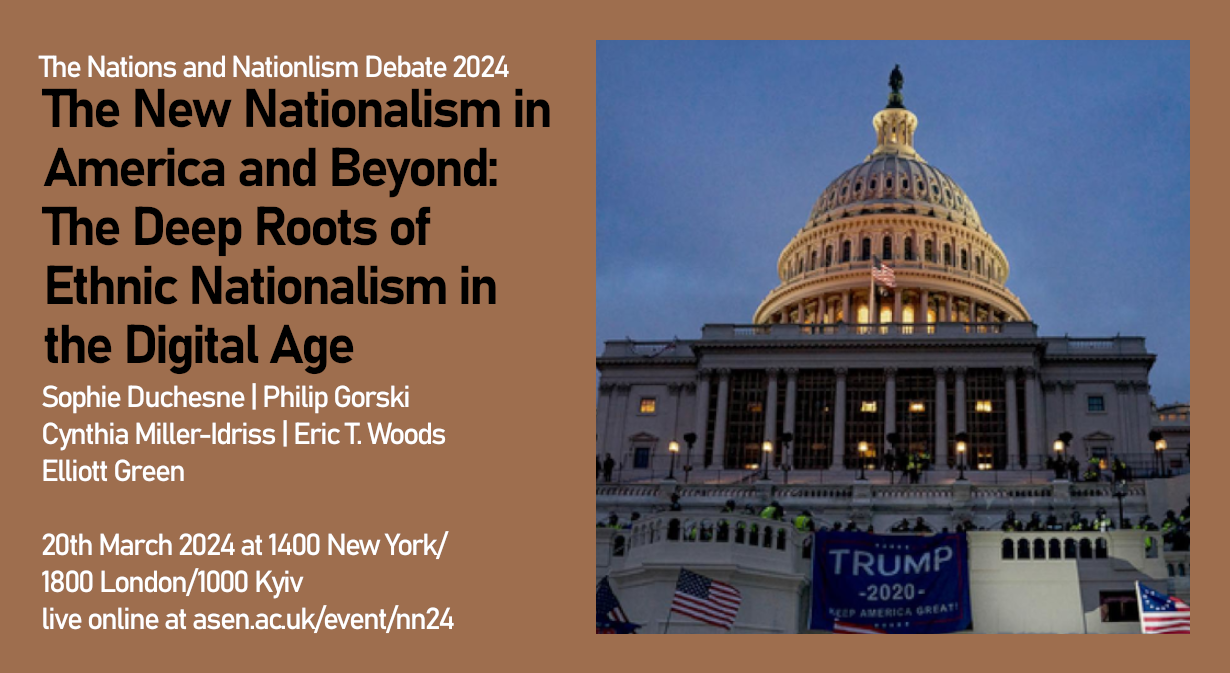The 2024 Nations and Nationalism debate, supported by LSE IDEAS, is on ‘The new nationalism in America and beyond: the deep roots of ethnic nationalism in the digital age’ by Robert Schertzer and Eric T. Woods. We will be live on Facebook and YouTube, with members receiving an invite to join on Zoom.
Our speakers, Sophie Duchesne, Philip Gorski and Cynthia Miller-Idriss join the authors, Robert Schertzer and Eric Woods, for a debate on their book which analyses the social media campaigns of Donald Trump, Marine Le Pen, and the Brexit campaigners, showing how today’s new nationalists are cultivating support from white majorities by tapping into their history and culture.
Across the West, there has been a resurgence of ethnic nationalism, populism, and anti-immigrant sentiment – a phenomenon that many commentators have called the “new nationalism.” In The New Nationalism in America and Beyond, Robert Schertzer and Eric Taylor Woods seek to understand why the bastions of liberalism are proving to be fertile ground for a decidedly illiberal ideology. To do so, they examine the social media campaigns of three of the most successful exemplars of the new nationalism: Donald Trump in the US, Marine Le Pen in France, and Brexit in the UK. Schertzer and Woods show how today’s new nationalists are cultivating support from white majorities by drawing from long-standing myths and symbols to construct an image of the nation as an ethnic community. Their cutting-edge and multidisciplinary approach combines elements of political science, sociology, history, and communication and media studies, to show how leaders today are updating the historical foundations of ethnic nationalism for the digital age.
Meet the speakers and chair
Sophie Duchesne is a political sociologist at CNRS / Centre Emile Durkheim, Sciences Po Bordeaux. Her research is in citizenship and individualism, and national and European identities. She published “Citoyenneté à la Française” (Paris, Presses de Sciences).
Philip S. Gorski (Ph.D. University of California, Berkeley 1996) is a comparative-historical sociologist with strong interests in theory and methods and in modern and early modern Europe. His empirical work focuses on topics such as state-formation, nationalism, revolution, economic development and secularization with particular attention to the interaction of religion and politics. Other current interests include the philosophy and methodology of the social sciences and the nature and role of rationality in social life. Among his recent publications are “The Disciplinary Revolution: Calvinism and the Growth of State Power in Early Modern Europe” (Chicago, 2003); “Max Weber’s Economy and Society: A Critical Companio”n (Stanford, 2004); and “The Poverty of Deductivism: A Constructive Realist Model of Sociological Explanation,” Sociological Methodology, 2004. Philip Gorski co-runs the Religion and Politics Colloquium at the Yale MacMillan Center
Cynthia Miller-Idriss is a sociologist and professor in the School of Public Affairs and in the School of Education, American University and runs the Polarization and Extremism Research & Innovation Lab (PERIL). Dr. Miller-Idriss has testified several times before the U.S. Congress and regularly briefs policy, security, education and intelligence agencies in the U.S., the United Nations, and other countries on trends in domestic violent extremism and strategies for prevention and disengagement. She is the author, co-author, or co-editor of six academic books, including her most recent books “Hate in the Homeland: The New Global Far Right” (Princeton University Press, 2020) and “The Extreme Gone Mainstream: Commercialization and Far Right Youth Culture in Germany” (Princeton University Press, 2018). She has also published over one hundred peer-reviewed articles, book chapters, and essays on nationalism, extremism, education, higher education and internationalization.
Robert Schertzer is an Associate Professor in the Departments of Political Science at the University of Toronto and UTSC. His research and teaching focus on the intersections of three areas: federalism, judicial politics, and ethno-national diversity, with a tendency to look at Canada from a broadly comparative perspective. He is the author of “The Judicial Role in a Diverse Federation: Lessons from the Supreme Court of Canada” (University of Toronto Press, 2016) and “The New Nationalism in American and Beyond” (Oxford University Press, 2022, with Eric Taylor Woods). His work has been published in Nations and Nationalism, Ethnic and Racial Studies, the Canadian Journal of Political Science, Publius, and the International Journal of Constitutional Law. He is also the founding co-editor of The State of Nationalism, an open-access portal for review articles on the study of nationalism.
Eric T. Woods is an Associate Professor in Sociology, School of Society and Culture at the University of Plymouth. His research and teaching examines the intersections of politics, culture, and media – with a particular focus on how these phenomena relate to nationalism. His most recent book (co-authored with Dr Robert Schertzer) is entitled, ‘The New Nationalism in America and Beyond: The Deep Roots of Ethnic Nationalism in the Digital Age‘ (Oxford University Press, 2022). He also researched the cultural politics of Britain’s imperial past, and he has published extensively on Christian-Indigenous relations in Canada, including the 2016 book, ‘A Cultural Sociology of Anglican Mission and the Indian Residential Schools in Canada‘ (Palgrave, 2016). He has also edited several multi-author volumes on these topics, including on the role of rituals in the forging of nations; the potential for cultural sociology to shed new light on nationalism; and on nationalism and conflict management. Alongside his scholarly publications, he is keen to contribute to public debates through venues such as The Conversation and LSE Blogs.
Elliott Green is Professor in Development Studies in the Department of International Development at the LSE. He is currently Director of the department’s PhD program and convener of the MSc Course ‘Key Issues in Development Studies’ (DV442). Elliott has three main research areas: 1) ethnic politics and national identity in Africa, 2) patronage, clientelism and African development, and 3) the political demography of modern Africa. He has conducted fieldwork in Uganda, Tanzania and Botswana, and for several years taught a course entitled ‘Poverty and Development’ at the annual LSE-University of Cape Town Summer School. His research has published in a variety of academic journals, including the British Journal of Political Science, Comparative Politics, Economic Development and Cultural Change, International Studies Quarterly, Journal of Modern African Studies, Studies in Comparative International Development and World Development, among others. He currently sits on the editorial boards of the Journal of Development Studies, Nations and Nationalism and Regional and Federal Studies, and is a series editor for the book series “Politics and Development in Contemporary Africa” published by the International Africa Institute. Outside academia he has briefed the British High Commissioner to Uganda twice (in 2008 and 2010) and regularly writes blog entries for a variety of websites.
More information about the event
The book can be purchased in physical format via online bookshops such as Book depository: New-Nationalism-America-Beyond.
This event is hosted by LSE IDEAS and Nations and Nationalism
Event hashtag: #LSENewNationalism
LSE IDEAS (@lseideas) is LSE’s foreign policy think tank. Through sustained engagement with policymakers and opinion-formers, IDEAS provides a forum that informs policy debate and connects academic research with the practice of diplomacy and strategy.
Nations and Nationalism (@nationalism) is published on behalf of the Association for the Study of Ethnicity and Nationalism (ASEN) in partnership with LSE IDEAS. The journal is published quarterly by Wiley.

